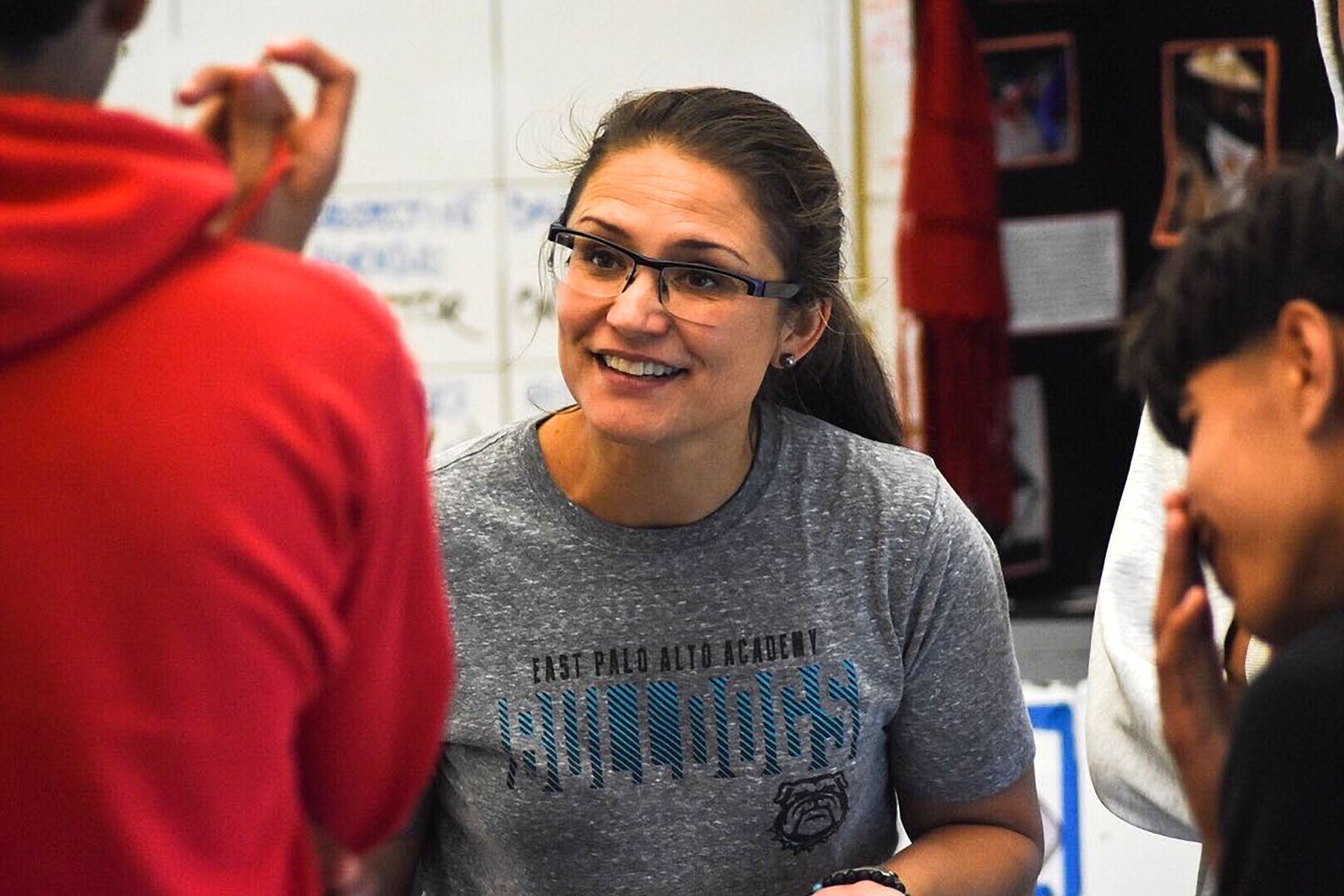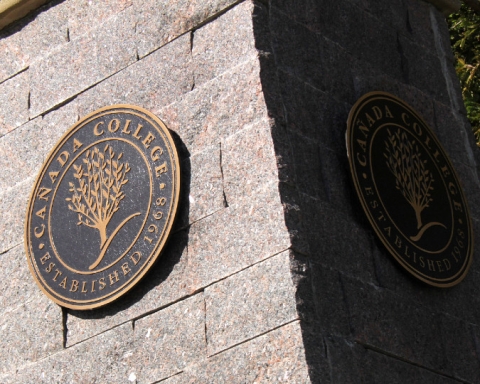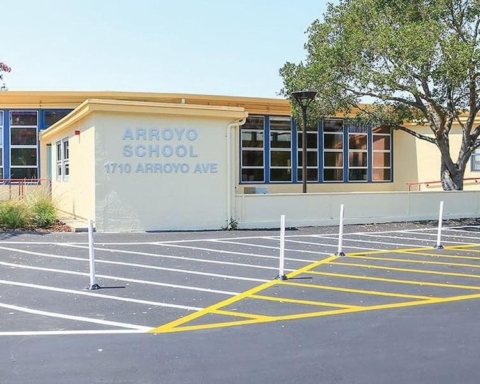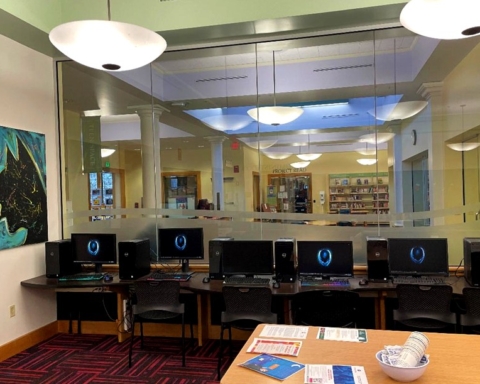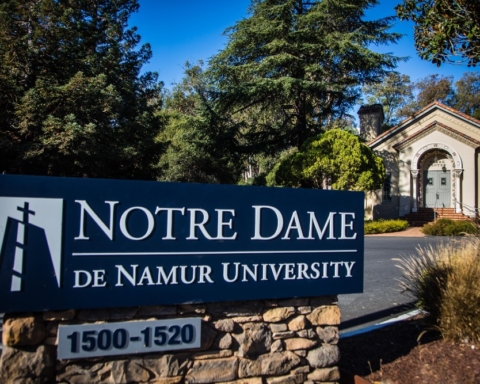From an early age, Amika Guillaume saw the world through a different lens. “We had bars on our windows when I was growing up,” she remembers. “I thought they were beautiful. I thought they made the house look fancy. My grandmother was proud of those bars. It meant you had valuable stuff. It wasn’t till years later, when I was in college, that I realized those bars meant you lived in a poor neighborhood.”
Today Guillaume is principal of East Palo Alto Academy, a public charter high school within the Sequoia Union High School District. There are still bars on many of the surrounding houses. But where others see the struggles, what Guillaume sees in this community are courage, resilience, and “the beauty of what is possible.”
“I am obsessed with this idea that no matter where you were born in this country, you should have the opportunity to have an excellent education,” says Guillaume. “I believe we fail as a democracy if we do not give this opportunity to everybody.”
The child of a Filipina mother and a Czech father, Guillaume attended 27 schools in her youth, hop-scotching across New Mexico, Florida and Southern California to follow her father’s Air Force career. Both sets of grandparents knew harrowing hardships. “My mother’s father survived the Bataan Death March, fighting for the U.S. in World War II,” she says. “My paternal grandmother watched her mother and grandmother board the train for Auschwitz. They sacrificed so much to get their families to this country.”
Paths to Success
Social consciousness awakened early, but Guillaume also acknowledges a tension she felt as the child of immigrants.
“It’s a strange dichotomy you see in a lot of immigrant children,” she muses. “A part of you wants to be very successful and buy nice things. I wanted to be general manager of a fancy hotel at one point. I was fascinated by Donald Trump; I read ‘The Art of the Deal’ in eighth grade. I remember thinking: You can really do incredible things in the U.S. Then, I read an article about somebody who lost their generations-old shop so they could build a Trump Tower.”
Education, she realized, is the equalizer. “So many of my students live with food, housing and immigration insecurity. If they drop out, they will struggle for the rest of their lives. There is no pussyfooting around that. Some kids—ones with more wealth or privilege—they’ll be OK. Mine will not.” It’s a story she tells forcefully to her East Palo Alto Academy families, drawing on her own experiences to drive it home. “I don’t look like a person of color, but I feel that way, because I am half. I know what it is like to go to school when you’re cold, when you’re tired, when you aren’t sure if there is going to be food in the refrigerator.”
Guillaume first encountered Teach for America when she was in grade school in Long Beach. TFA recruits graduates from top colleges and trains them to teach in low-income schools for two years. These young teachers left a deep impression on Guillaume, especially after her family started taking them in to live in their home. “They were wonderful human beings,” says Guillaume. “I thought: ‘I want to be around that!’”
When it came time for college, Guillaume did a brief stint at UC Santa Barbara before transferring to UCLA to be closer to home. “Mom needed me,” she says. “I was the oldest of five, and my grandmother, who lived with us, was sick.” At UCLA, she earned dual degrees in history and French, was a standout varsity rower (snagging most inspirational and most valuable awards), and spent a couple of summers teaching low-income students of color at Santa Monica High School.
Teacher Drop-outs
Upon graduation, Guillaume joined Teach for America herself, and stayed for seven years. She loved it, but something troubled her. “I kept seeing highly successful, intelligent, motivated teachers leaving the profession. You’d think the teaching would feed their souls and make them stay. But it didn’t—and it was often because of the leadership they encountered in the schools.”
Next stop: a “really cool” 15-month program at Harvard that included classes at the university’s schools of education, business and law. Armed with her new master’s degree in education and school leadership from Harvard, Guillaume returned to the Bay Area and embarked on a succession of teaching jobs in Oakland, East San Jose, and East Palo Alto. When a friend who was principal at Cesar Chavez Academy in East Palo Alto offered her a job, she requested 7th grade language arts. The reason? “The district had started ‘tracking’ students (sorting them by test performance into different tracks that directed their academic futures) based on their 7th grade standardized test scores,” Guillaume says. “Seventh grade! I think it’s wrong that college should be decided by the time you’re 12.”
The Chavez teaching position progressed to a vice-principalship, and then, the principal’s job. It was a challenging administrative role because it included oversight of three programs on one campus: Cesar Chavez, Green Oaks Academy, and Los Robles, a dual language immersion program.
In 2015, Guillaume became principal at East Palo Alto Academy. The place is a study in statistical contrasts: 98 percent of its 360 students are people of color; 95 percent qualify for free/reduced lunch; 75 percent are English language learners; and 65 percent are the first in their family to go to high school.
Yet 72 percent of 2020 graduates went directly to four-year colleges, with another 8 percent enrolling in other post-secondary training. Those numbers are a dip down from 2019’s numbers of 96 percent college enrollment and 3 percent other; the decline is likely due at least in part to the pandemic. During Guillaume’s tenure, academic gains have been steady, and the number of students who not only get to college, but stay there, is also rising. Seventy percent of the academy’s low-income students of color who are first-generation college attenders are “persisting” in college—well above the national average of 42 percent for that group.
Donor Support
“Amika has done a wonderful job,” says Elisabeth Landa, who as executive director of the East Palo Alto Academy Foundation has worked closely with Guillaume for the past four years. “She has a passion and a vision. As we like to say, we are diversifying the culture of power, and changing the lives of our students.” The foundation raises more than $1 million per year and sponsors a number of programs to help East Palo Alto Academy students get to college and thrive there. “We are lucky to have such generous donors,” says Guillaume of the foundation’s impact.
The academy also benefits from operating within the Sequoia High School district, a “basic aid” district whose funding model is tied to the local property tax base. As such, the school fares better financially than many whose districts operate on the ADA model—”average daily attendance.”
“We spend about $15,000 per pupil each year,” says Guillaume. That’s well above California’s average of $11,000. But the bigger picture of school funding in the state troubles her.
“California is 37th in the country in per pupil spending,” says Guillaume. “Think about that. We are literally in the shadow of Amazon, Facebook and Stanford. Don’t tell me our state does not have the money. California’s GNP rivals that of many developed nations. Are we really satisfied with 37th?”
The partnerships that Guillaume forges may be just as important as funding in producing success. Guillaume is a “master collaborator,” according to Paitra Houts, Director of Community Engaged Learning in Education at Stanford’s Haas Center for Public Service, a program that connects Stanford faculty with community-based projects. “She creates deep and lasting partnerships.” One current example: A Spanish class co-taught by the East Palo Alto Academy and Stanford instructors, which enrolls students from both the high school and the university, who all learn together. “The focus is on reciprocity,” says Houts.
“Amika understands the current pulse of where things are at in the community,” she says. “She understands both the assets and needs. She is also super creative and highly focused on problem-solving. When something isn’t working, she finds another way. She has vision, but she is also flexible.”
Partnerships; funding; a driven, visionary leader—all are important. But the key ingredient, says Guillaume, is her teachers. “I have never been surrounded by so many qualified, hardworking, passionate teachers who know that good isn’t good enough. They believe in what our students are capable of. I challenge you to find a group of teachers anywhere who is more passionate about that idea.”
“Amika is the proud, proud principal of East Palo Alto Academy, says Landa. “She knows everyone’s name, everyone’s story. She has created a community where everyone feels at home.”
Lessons Brought Home
Guillaume met her French husband, Nicolas Guillaume, in a Louisiana restaurant in 1998. She was waitressing at night to boost her slender teaching salary; he was a patron. He asked her out. She turned him down—but did invite him to come speak to her students about his construction career. Today, the couple lives in San Carlos with their three daughters.
“My husband and I like to say we meet in the middle each night in our little bungalow in San Carlos,” she says. “He builds luxury homes for some of the wealthiest people in the world. I spend my days working with the students and families of East Palo Alto, a community that we love.” The Guillaumes made a conscious choice to send their kids to elementary school in East Palo Alto, in part because of the character they see in hard-working families who are given little, expect nothing and rise above long odds to achieve better lives.
“These are the kids I want my kids to be around,” she says simply. “They work hard, help their families, and know what real problems are.” The other reason for their choice: the Spanish-English immersion program at Los Robles, which has students completely bilingual by third grade. “This is an absolutely wonderful program,” says Guillaume. “Parents who complain about not having a good immersion program in Redwood City or Menlo Park should really check it out.” The Guillaume kids are trilingual: English, French and Spanish.
Like that child who straddled two worlds, Guillaume still lives and breathes the inequities of the world. She knows the quest to change it is very much a work in progress. And, as ever, she sees beauty in the struggle.
“I know how hard things are,” she says. “I also know that it shouldn’t be this hard. But at EPAA we also know how to celebrate, be positive; retain a sense of possibility. I look at my students, and they remind me of myself—highly capable, intelligent. They keep showing us, over and over again, why they are at the top of every level. The inequities of this world are theirs for the changing. And they will do it.”

